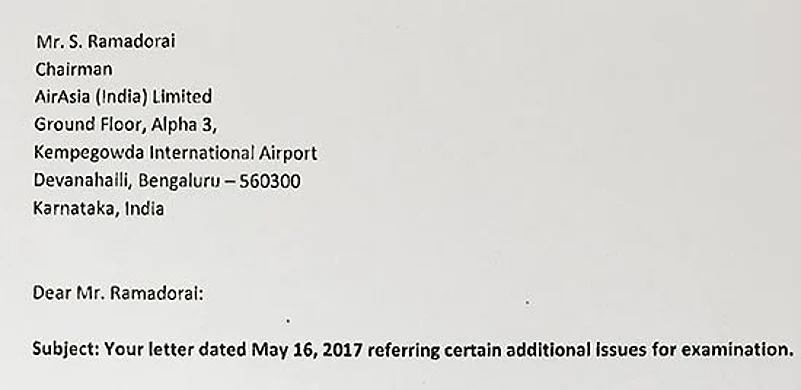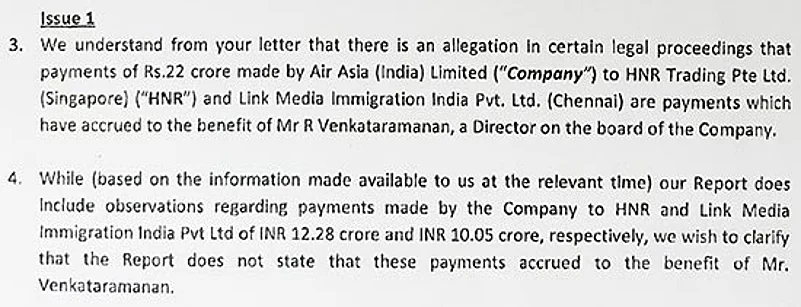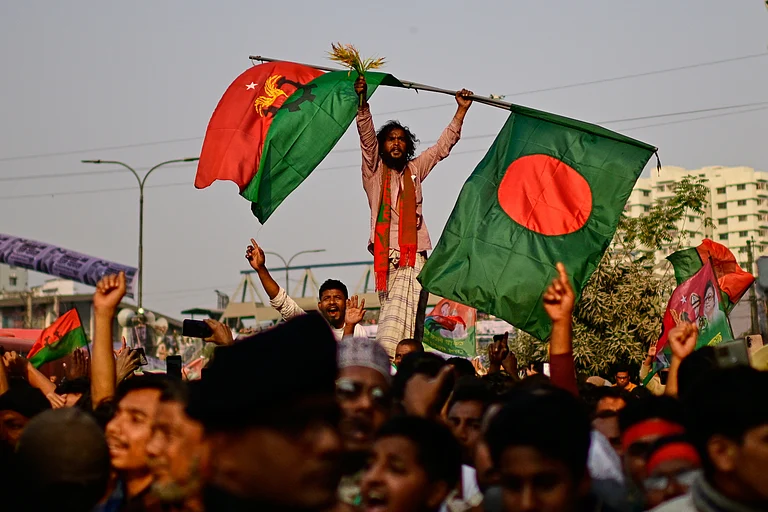With the Central Bureau of Investigation (CBI) charging the airline with criminal conspiracy, for trying to change aviation rules in its favour, the corruption taint on AirAsia has got Tata Trusts managing trustee Ramachandran Venkataramanan placed on the top of the list of accused. A set of documents accessed and reviewed by Outlook deflects the focus elsewhere.
In its FIR, the central agency has named Venkataramanan, AirAsia Berhad (AAB) group CEO Anthony ‘Tony’ Fernandes and AAB group deputy CEO T. Kanalingam, along with lobbyists Deepak Talwar and Rajendra Dubey. Venkataramanan is accused of securing “mandatory approvals, some of them through non-transparent means, including the FIPB (Foreign Investment Promotion Board) clearance, NOC and the attempt for removal/modification of the 5/20 rule”.
In June 2016, when TDP MP Ashok Gajapathi Raju was civil aviation minister, the Modi government changed the 5/20 rule that had barred airline startups from going global. After this change, a new airline did not need to wait for five years before starting international operations, “provided that they deploy 20 aircraft or 20 per cent of total capacity (in term of average number of seats on all departures put together), whichever is higher, for domestic operations”.


Deloitte’s letter on the forensic audit
The FDI rule was changed during the Congress-led UPA government. The FIPB approval for AirAsia had come much before Tata Trusts nominated Venkataramanan to hold 1.5 per cent equity, during a 2016 restructuring exercise to infuse more capital when Tata Sons wanted to avoid consolidation due to losses faced in its telecom venture. Tata Sons and AAB hold 49 per cent stake each in AirAsia. Venkataramanan was a non-executive director in the company since 2013. As managing trustee of Tata Trusts, he was nominated as its representative. Until 2012, he was executive assistant to then Tata Trusts chairman Ratan Tata.
It appears the CBI may have conflated legitimate lobbying to ensure a level playing field for new airlines with accusations of a criminal offence. Several experts had been criticising the earlier 5/20 rule as it made international operations in civil aviation into an old boys’ club for ‘legacy airlines’ by excluding startups in aviation. While the CBI claims in its FIR that the change in the regulation was done through backdoor deals, press releases and public statements by the Tata Group show they were openly lobbying for the government to change it.


Chandilya’s e-mail dated November 1, 2014
Mrithyunjay ‘Mittu’ Chandilya was made CEO of AirAsia (India) in 2013 when Cyrus Mistry was the chairman of Tata Sons. As per documents with Outlook, Chandilya had assumed an active role in meeting with politicians and ministers to lobby for changing the rule. In an e-mail dated November 1, 2014, Chandilya wrote he would be meeting BJP president Amit Shah to “advocate the abolishment (sic) of the 5/20 rule”. Chandilya resigned as CEO in 2016. Recently, he also parted ways with the Adani Group, where he was the CEO of Adani Logistics.
Things changed drastically in October 2016 when Mistry was ousted as Tata Sons chairman. In his famous letter after his ouster, he cited a “forensic audit that revealed fraudulent transactions of Rs 22 crore involving non-existent parties in India and Singapore” and alleged that Venkataramanan did not want to pursue it when it was raised during an AirAsia board meeting. Following a public outcry after the letter, Deloitte Touche was asked to re-examine its forensic audit report to see if it had made allegations against Venkataramanan.
Deloitte’s response, accessed by Outlook, seems to indemnify Venkataramanan. It says “…the report does not state that these payments accrued to the benefit of Mr Venkataramanan” and “…we have not found any material to suggest” that he was the “beneficiary of these payments”. A week ago, CBI sleuths picked up documents and hard drives related to this forensic audit from Deloitte.
The CBI claims this money was used to pay bribes through a company called HNR Trading. It is not known whether the CBI is making this allegation after examining the company’s bank transactions to trace where the money went and if it was used for kickbacks. The agency did not respond to a detailed questionnaire from Outlook. It has alleged that AirAsia (India) transferred Rs 12.28 crore for the bribes to HNR Trading Pte Ltd in Singapore. The kickbacks were to be allegedly paid through two lobbyists, including Talwar, who is wanted for questioning in other cases and is currently on the run.
Outlook has accessed a March 2015 letter from AAB group CEO Fernandes to Chandilya, asking him to “appoint and to sign up” HNR Trading “to act as an agent to assist AirAsia’s regulatory and corporate affairs liaising”. Fernandes gave Chandilya this direction based on discussions at a March 21, 2015 AirAsia board meeting. In November 2, 2016, Chandilya wrote an e-mail, expressing dismay at the AirAsia board that selective details were being leaked to the media, creating a defamatory image of him.
Chandilya also claimed to possess a call recording where appointment of lobbyists and how to influence ministers was discussed. It is believed the CBI now has a copy of this audio clip. In his reply to this e-mail, Fernandes says the whole imbroglio at AirAsia was due to a “proxy battle going on in Tata Sons”. The battle seems to be playing out in the CBI’s backyard now. Neither was the letter to appoint the lobbyists written by Venkataramanan, nor was he present at the said board meeting.
The CBI claims the Tata Group had approached the UPA government to change the rule in 2013, and a note, classified ‘secret’, on abolishing the 5/20 rule was circulated in the cabinet on February 27, 2014. There seems little secret to it since there had been news reports a month earlier, quoting the then civil aviation minister, Ajit Singh, as saying the rule needed to be abolished and that it would be done by the end of February 2014—before the Lok Sabha election was notified. Interestingly, the CBI’s FIR was lodged on the day of the recent Kairana Lok Sabha bypoll, which was won by Tabassum Khan of Ajit Singh’s party, the Rashtriya Lok Dal.
The Tata-Mistry public spat has gone to the courts, including the National Company Law Tribunal. The conflict has also extended to Mistry’s chosen CEO Chandilya with suits and counter-suits. Since his exit, AirAsia has sued Chandilya at a Bangalore court to recover the Rs 22 crore and an additional Rs 1.13 crore, which Chandilya allegedly claimed to cover his personal expenses. The company also made a criminal complaint to the Karnataka Police in 2017. In his November 2, 2016 e-mail, Chandilya had clarified these expenses with the AirAsia board, claiming to have had the approvals.
The CBI’s FIR is silent on how the bribes were paid, except for a mysterious reference to one “Mr Sriram”, who was allegedly paid Rs 50 lakh in cash at the cafe of a posh Mumbai hotel in December 2014. The FIR says nothing on Sriram’s role, evidence of the payment or how exactly he was going to influence the government to change the 5/20 rule.


























